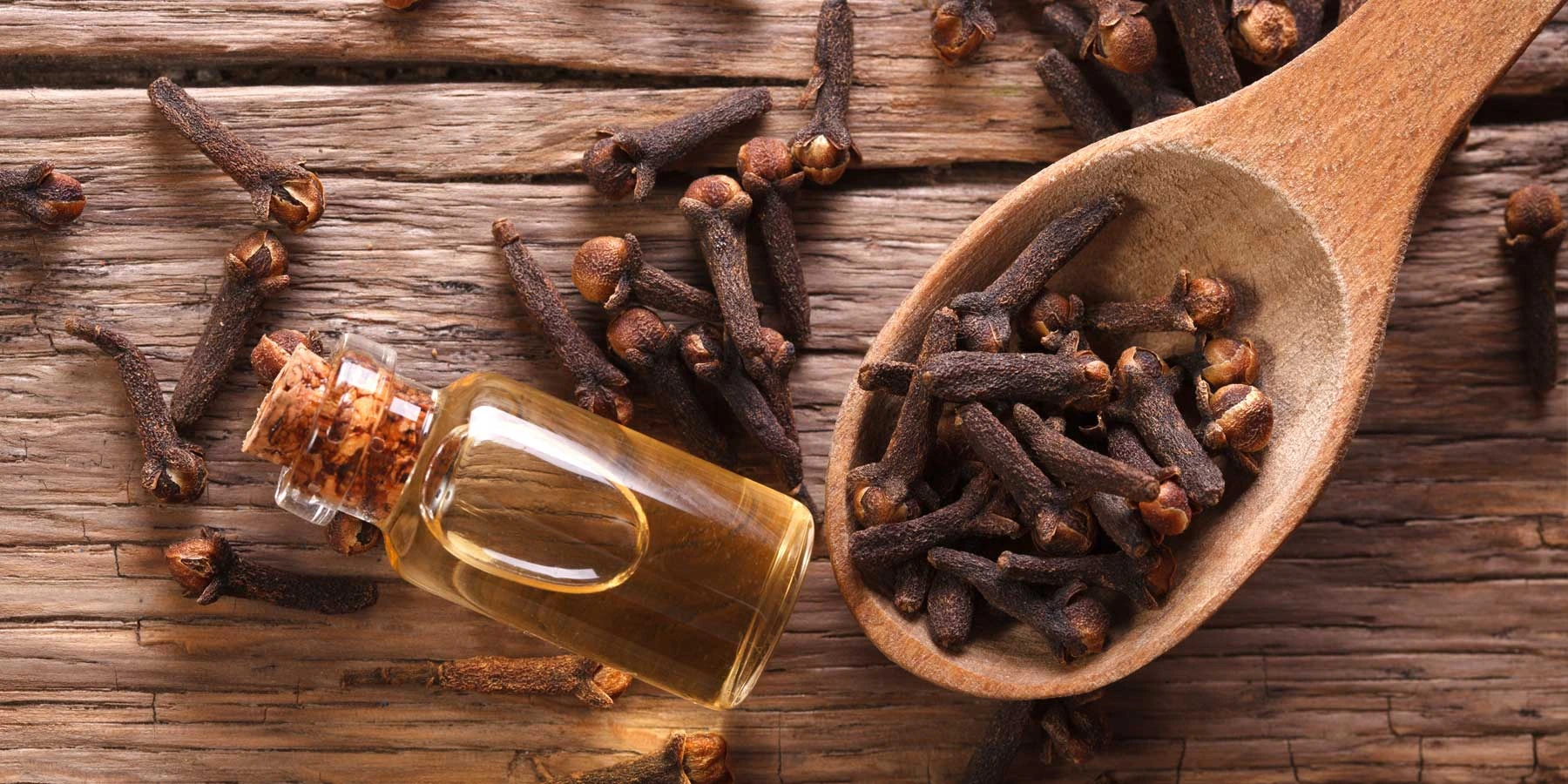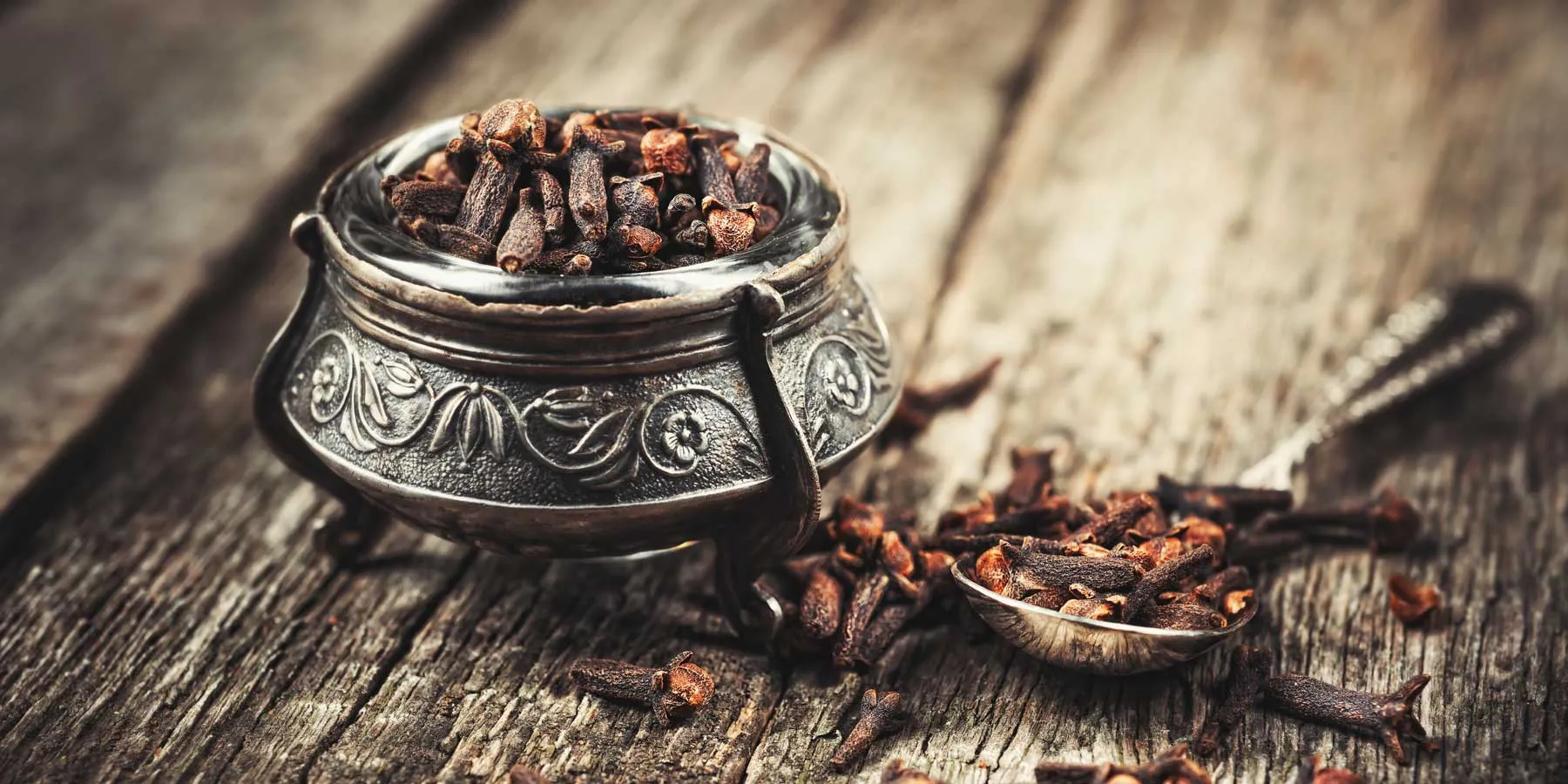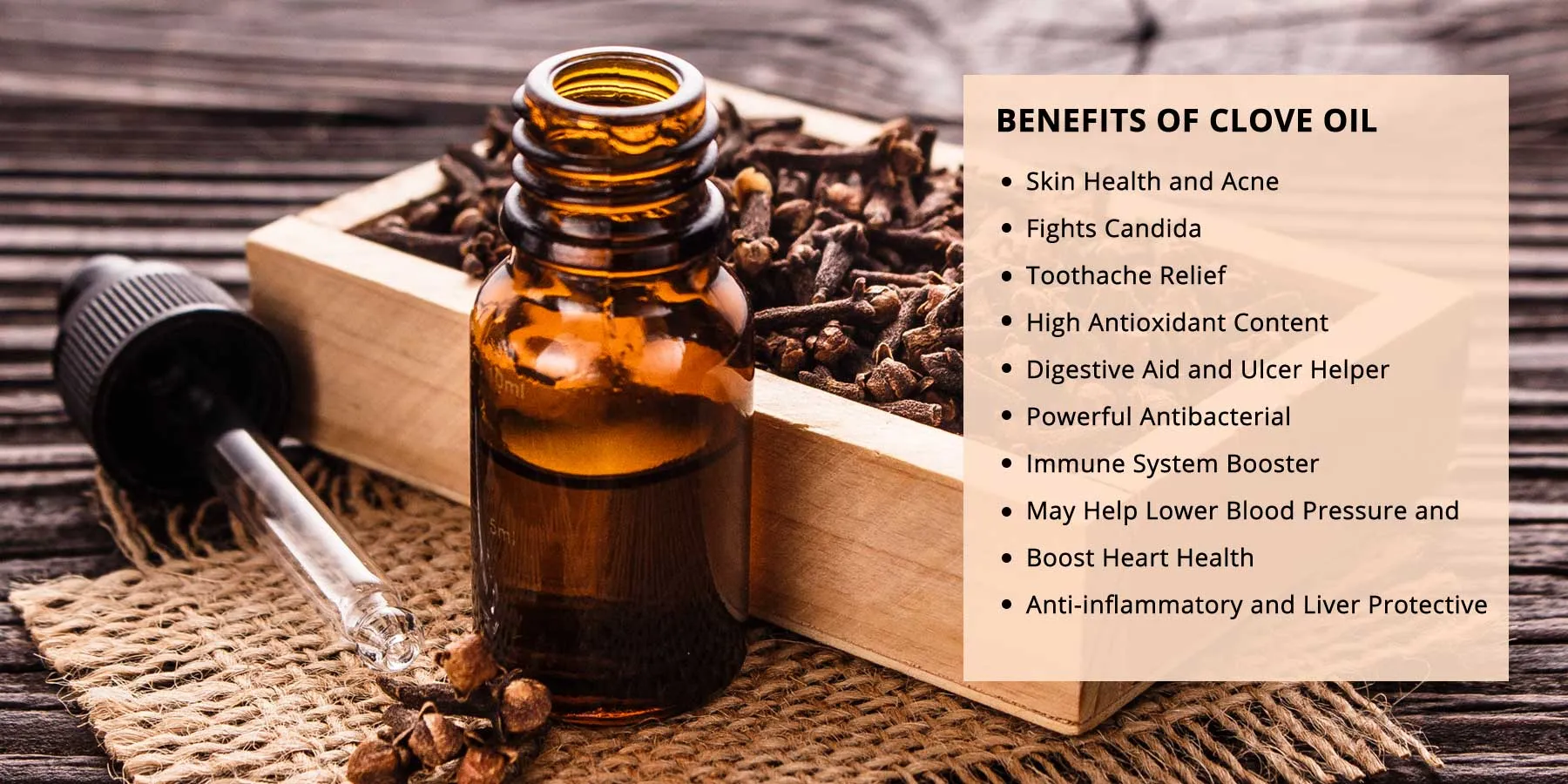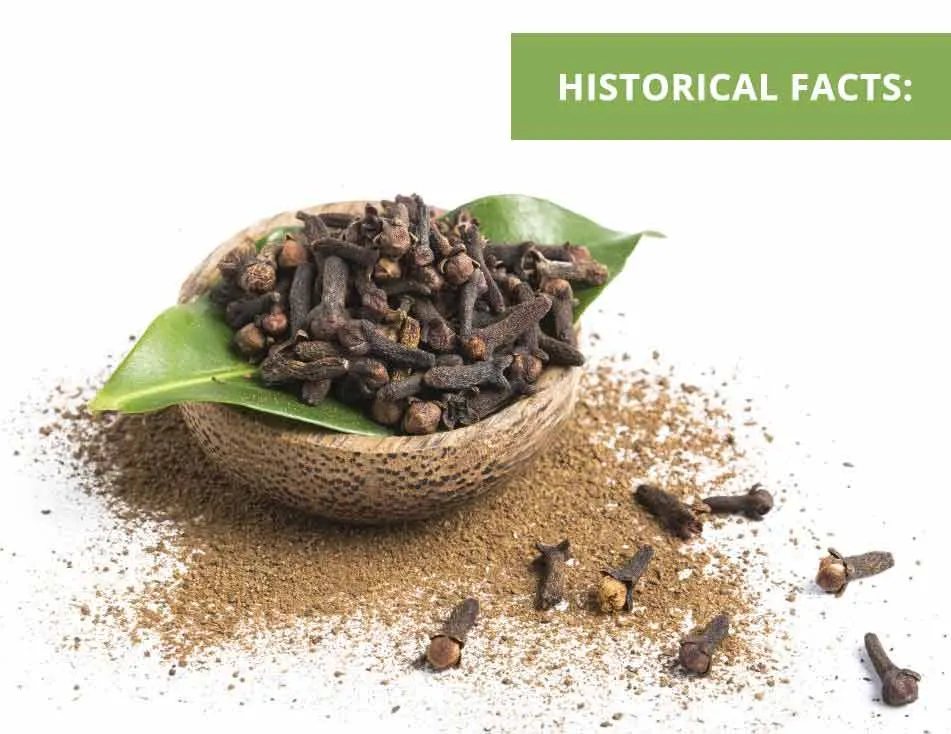Benefits and Uses of Clove Essential Oil

What is clove oil?
Indigenous to Indonesia and Madagascar, clove (Eugenia caryophyllata) can be found in nature as the unopened pink flower buds of the tropical evergreen tree. Picked by hand in late summer and again in winter, the buds are dried until they turn brown. The buds are then left whole, ground into a spice or are steam-distilled to produce clove essential oil.
The island of Zanzibar (part of Tanzania) is the world’s biggest producer of cloves. Other top producers include Indonesia and Madagascar. Unlike most other spices, clove can be grown throughout the entire year, which has given native tribes that use it a distinct advantage over other cultures because the health benefits can be enjoyed more readily.
Cloves can be anywhere from a half-inch to three-quarters of an inch in length. They generally are composed of 14 percent to 20 percent essential oil. The main chemical component of the oil is eugenol, which is also responsible for clove oil’s strong fragrance.
What are the uses?

Clove oil uses range from improving blood circulation and reducing inflammation to helping acne and boosting gum health. One of the best-known clove oil uses is to reduce the pain associated with dental problems. Even mainstream toothpaste makers agree that clove oil reduces the pain and swelling that comes with a toothache.
In addition to being a proven anti-inflammatory and pain reducer, one of the common clove oil uses is as a broad-spectrum antimicrobial to keep countless diseases at bay, which is why it can be such a wise choice for boosting the immune system as well as a powerful addition to homemade cleaning products. In addition to its common medicinal uses (especially for oral health), eugenol is also commonly included in mouthwashes and perfumes, and it’s also employed in the creation of vanillin.
What are the benefits?

1. Skin Health and Acne
Scientific research demonstrates clove oil’s ability to effectively kill off both the planktonic cells and biofilms of a bacteria called Staphylococcus aureus or S. aureus. What does this have to do with skin health and, more specifically, acne? S. aureus is one of several strains of bacteria that have been scientifically linked with the pathogenesis of acne.
2. Fights Candida
One of the most powerful clove oil uses is fighting Candida. Candida has become quite a serious problem in the United States due to the SAD (Standard American Diet), which is high in sugar and acidity. Published in the journal Oral Microbiology & Immunology, a study was conducted to see how clove fared against other antifungal treatments and observed that it was as effective as nystatin, a drug commonly prescribed to manage yeast infections of the mouth (thrush), which has a slew of ugly side effects. Also, in addition to eliminating Candida, clove essential oil is effective at killing intestinal parasites.
3. Toothache Relief
One of the most well known clove oil uses, as a remedy for toothaches, was first documented in 1640 in the French “Practice of Physic,” although there is reason to believe that the Chinese were applying this homeopathic remedy for over 2,000 years.
Today, clove is widely accepted as a reliable solution for dry socket and for relieving the pain and discomfort associated with various dental disorders. The Journal of Dentistry, for instance, published a study in 2006 proving that clove essential oil had the same numbing effect as benzocaine, a topical agent commonly used before needle insertion.
Additionally, research has suggested that clove oil has even more far-reaching effects. The Indian Department of Public Health Dentistry recently conducted a study that evaluated clove’s ability to slow tooth decalcification, or dental erosion, compared to eugenol, eugenyl-acetate, fluoride and a control group. Not only did clove oil lead the pack by significantly decreasing decalcification, it was observed that it actually rematerialized teeth. This study highlights yet again that the so-called benefits of fluoridating our water supply and mainstream dental products is not worth the risk.
4. High Antioxidant Content
Second only to raw sumac bran, ground clove has the astounding ORAC value of 290,283 units! This means that per gram cloves contain 30 times more antioxidants than blueberries, which have a value of 9,621.
Antioxidants are molecules that reverse the damage caused by free radicals, including cell death and cancer. Research has shown that antioxidants slow aging, degeneration and protect the body against bad bacteria and viruses. Because of its high antioxidant count and eugenol levels, clove is also known as the ultimate “protective” herb and has been used in essential oil blends such as “Thieves” oil by Young Living and “On Guard” by DoTerra.
5. Digestive Aid and Ulcer Helper
One of the traditional clove oil uses has been for the treatment of common complaints related to the digestive system, including indigestion, motion sickness, bloating and flatulence (accumulation of gas in the digestive tract).
Research also demonstrates that clove oil may be able to help when it comes to ulcer formation in the digestive system. A study using various animal models published in 2011 finds that clove oil has both gastro-protective and anti-ulcer properties. The oil of cloves significantly enhanced gastric mucus production, which protects the lining of the digestive tract and prevents erosion that contributes to gastritis and ulcer formation.
6. Powerful Antibacterial
Clove oil has been shown to inhibit gram-negative and gram-positive bacteria as well as yeast. This is huge, especially since gram-negative bacteria are often resistant to antibiotics and other antibacterial interventions.
To evaluate its effectiveness as an antibacterial agent, researchers from the University of Buenos Aires set out to determine which bacteria are most sensitive to clove’s potency. According to their study, clove has the greatest antimicrobial ability over E. coli and also exerted considerable control over Staph aureus, which causes acne, and Pseudomonas aeruginosa, which causes pneumonia.
7. Immune System Booster
There’s a good reason why clove oil is included in the Four Thieves Oil Blend and On Guard Oil Blend.
With its potent antibacterial and antiviral abilities, clove oil can help boost the immune system to fight off, or even prevent, the common cold and flu. With its potent ability to kill the offenders that make us sick, clove oil is commonly highlighted as a top natural remedy for guarding yourself from illness, especially during cold and flu season.
8. May Help Lower Blood Pressure and Boost Heart Health
Clove oil may be able to help lower blood pressure in those with high blood pressure, whereby reducing hypertension. Animal research published in 2015 in the British Journal of Pharmacology reveals that the eugenol found in clove oil may be able to dilate major arteries in the body while also reducing systemic blood pressure. The study concludes, “Eugenol may be therapeutically useful as an antihypertensive agent.”
A scientific study also isolated another impressive active compound of cloves called acetyl eugenol. The researchers found acetyl eugenol to be a “potent platelet inhibitor” in human blood cells, which means it prevents the clumping together of platelets in the blood. Platelet aggregation (platelets clumping together) is one of the factors that lead to the formation of a thrombus or blood clot.
This is definitely a significant finding since anti platelet, or blood thinning; medications are commonly used to treat coronary heart disease and to reduce the risk of heart attack. Clove is known to act as a natural blood thinner, so much so that it’s not recommended to combine clove oil with other conventional blood thinners.
9. Anti-inflammatory and Liver Protective
Although it has been suspected for centuries to treat inflammatory conditions, the Journal of Immunotoxicology just recently published the first-ever study proving that the eugenol in oil of cloves is indeed a powerful anti-inflammatory.
This study demonstrates that low doses of eugenol can protect the liver against disease. It was also observed that eugenol reverses inflammation and cellular oxidation (which speeds the aging process). In addition, researchers noted that taking large doses internally could harm the digestive lining and using it externally can irritate sensitive skin. So, as with all essential oils, it’s important not to overdo it! Clove oil (and all essential oils) are extremely concentrated.
Historical Facts:
The Chinese have used clove for more than 2,000 years as a fragrance and spice. Cloves were brought to the Han dynasty of China from Indonesia as early as 200 BC. Back then, people would hold cloves in their mouths to improve breath odor during audiences with their emperor.
Clove cultivation used to occur pretty much exclusively in Indonesia until late in the 1700s when the French smuggled cloves from the East Indies to the Indian Ocean islands and the New World.
Clove oil was also one of the main essential oils that protected people from getting the bubonic plague in Europe. A group of robbers was caught by the king and he asked them why they weren’t ill or dead from the plague exposure they said it was because they covered themselves with this protective blend of oils (“thieves oil”), which included clove.
The ancient Persians supposedly used clove oil as a love potion.
Ayurvedic healers have long-used clove oil to treat digestive issues, fever and respiratory problems. In Traditional Chinese Medicine, clove is highly acclaimed for its antifungal and antibacterial abilities. The list of clove oil uses throughout history is undeniable.

Note of Caution:
Clove is known to slow down blood clotting due to its eugenol content. Clove is known to interact with blood thinning medications such as anticoagulant/antiplatelet drugs and for this reason it should not be combined with such drugs.
Dilution of clove oil with a carrier oil like coconut is recommended for topical use. Using the oil undiluted on skin can cause irritation. When taking clove oil internally, do not use for longer than two weeks consecutively. Clove essential oil is typically not recommended for use with children under the age of 2.
Main Points:
· Clove essential oil is high in antioxidants and has potent anti-inflammatory, antibacterial, antiviral and antifungal properties, making it effective for a large variety of common health concerns including toothaches and Candida.
· Clove oil uses include the natural treatment of acne, the common cold, influenza, high blood pressure and digestive complaints.
· Clove oil can be used externally or internally depending on the health concern. For high blood pressure and cold/flu relief, try diffusing clove oil in your home or office.
References:
RELATED POSTS